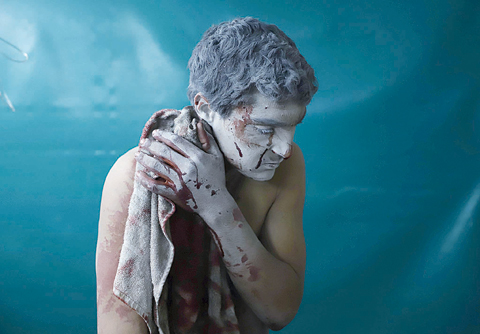 ZAMALKA, Syria: A wounded Syrian man waits for treatment at a makeshift clinic during Syrian government air strikes on Zamalka, in the rebel enclave of Eastern Ghouta. —AFP
ZAMALKA, Syria: A wounded Syrian man waits for treatment at a makeshift clinic during Syrian government air strikes on Zamalka, in the rebel enclave of Eastern Ghouta. —AFPBEIRUT: The Syrian regime has been accused several times of torture and summary executions in its jails during the conflict that is entering its eighth year.The Syrian Observatory for Human Rights says at least 60,000 people have died from torture or harsh conditions in regime custody since the conflict began in March 2011. The Britain-based war monitor says half a million people have passed through regime jails.
Damascus has strongly denied the allegations against it and has pointed to gross abuses by its opponents, both jihadists and other rebels. Several thousand people have died in prisons run by jihadists or other rebels, who have also carried out summary executions not only of government troops but also of civilians, the Observatory says. Here is a summary of the allegations against the regime:
'Torture archipelago'
In July 2012 US-based group Human Rights Watch said Syria was holding tens of thousands of detainees in a "torture archipelago". It documented 27 detention facilities nationwide it said were used to hold people swept up in the government's crackdown on protesters. "Almost all" described experiencing or witnessing torture, including "prolonged beatings, often with objects such as batons and wires", HRW said. Other methods included "holding the detainees in painful stress positions for prolonged periods of time, often with the use of specially devised equipment, the use of electricity, burning with car battery acid, sexual assault and humiliation, the pulling of fingernails and mock execution."
Photographer reveals abuses
In 2014 a former Syrian military photographer codenamed "Caesar", who defected, revealed 55,000 photos which gave a glimpse of some of the abuses being committed in Syrian jails. The digital images of 11,000 dead detainees showed emaciated bodies and "Caesar" described seeing corpses with "deep wounds and burns and strangulations". "They were starved to death and their bodies looked like skeletons. These people died of starvation," Caesar said, adding he had never seen anything like it except for images taken during the Nazi regime in World War II.
Extermination
In February 2016, UN investigators said that "the mass scale of deaths of detainees suggests that the government of Syria is responsible for acts that amount to extermination". A year later, human rights organisation Amnesty International said as many as 13,000 people were hanged between 2011 and 2015 at the notorious Saydnaya military-run prison near Damascus. It said the mass hangings came on top of the 17,700 people it had already recorded as having perished in regime prisons since the start of the conflict in March 2011. Amnesty said it had interviewed 84 witnesses, including guards, detainees and judges, and alleged a pattern of repeated summary executions, mostly of civilians. In May 2017, Washington claimed that Damascus had built a "crematorium" at Saydnaya to cover up thousands of prisoner deaths.- AFP










